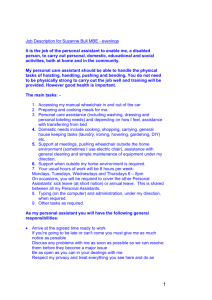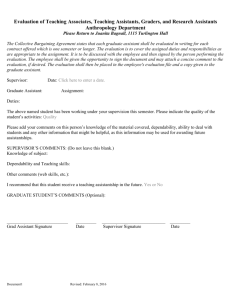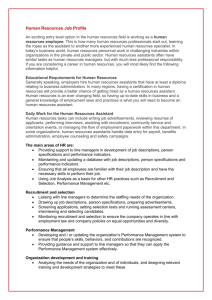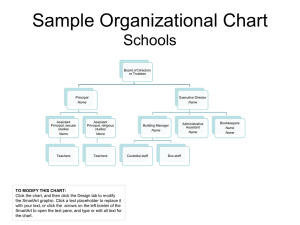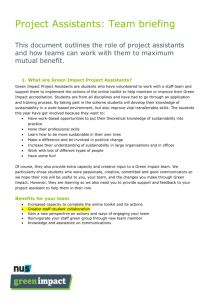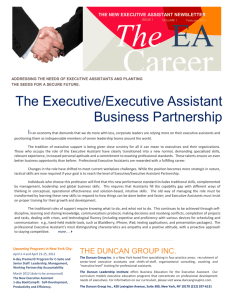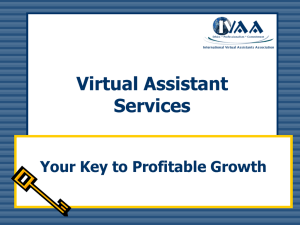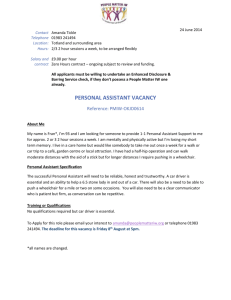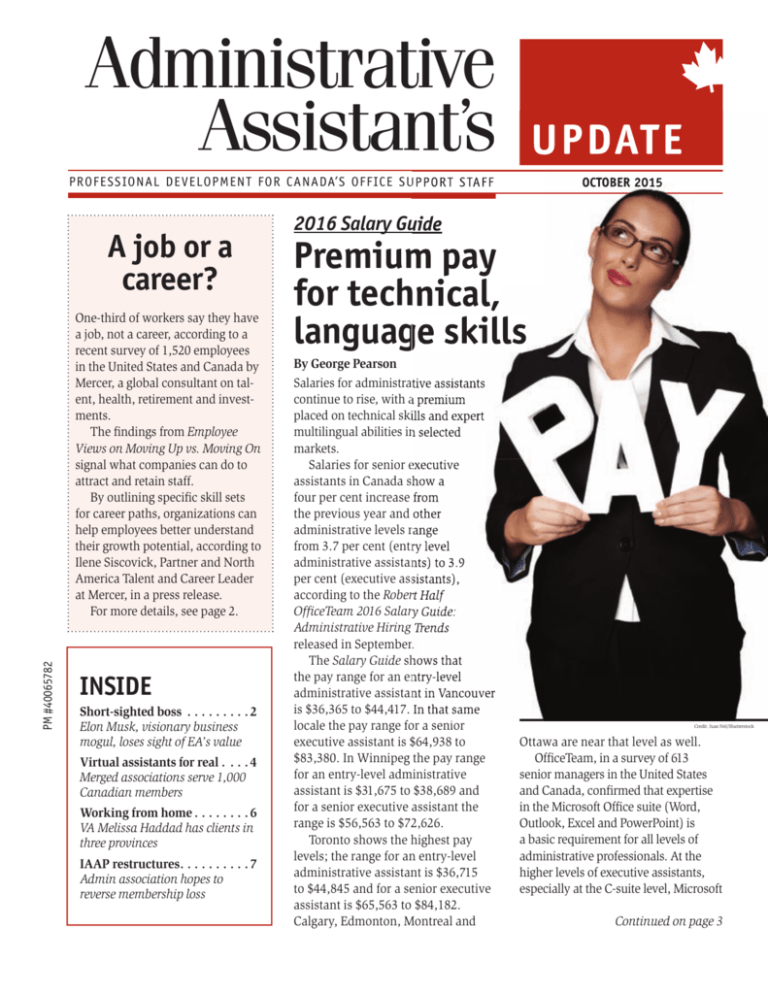
Administrative
Assistant’s
UPDATE
OCTOBER 2015
PROFESSIONAL DEVELOPMENT FOR CANADA’S OFFICE SUPPORT STAFF
A job or a
career?
PM #40065782
One-third of workers say they have
a job, not a career, according to a
recent survey of 1,520 employees
in the United States and Canada by
Mercer, a global consultant on talent, health, retirement and investments.
The findings from Employee
Views on Moving Up vs. Moving On
signal what companies can do to
attract and retain staff.
By outlining specific skill sets
for career paths, organizations can
help employees better understand
their growth potential, according to
Ilene Siscovick, Partner and North
America Talent and Career Leader
at Mercer, in a press release.
For more details, see page 2.
INSIDE
Short-sighted boss . . . . . . . . . 2
Elon Musk, visionary business
mogul, loses sight of EA’s value
Virtual assistants for real . . . . 4
Merged associations serve 1,000
Canadian members
Working from home . . . . . . . . 6
VA Melissa Haddad has clients in
three provinces
IAAP restructures. . . . . . . . . . 7
Admin association hopes to
reverse membership loss
2016 Salary Guide
Premium pay
for technical,
language skills
By George Pearson
Salaries for administrative assistants
continue to rise, with a premium
placed on technical skills and expert
multilingual abilities in selected
markets.
Salaries for senior executive
assistants in Canada show a
four per cent increase from
the previous year and other
administrative levels range
from 3.7 per cent (entry level
administrative assistants) to 3.9
per cent (executive assistants),
according to the Robert Half
OfficeTeam 2016 Salary Guide:
Administrative Hiring Trends
released in September.
The Salary Guide shows that
the pay range for an entry-level
administrative assistant in Vancouver
is $36,365 to $44,417. In that same
locale the pay range for a senior
executive assistant is $64,938 to
$83,380. In Winnipeg the pay range
for an entry-level administrative
assistant is $31,675 to $38,689 and
for a senior executive assistant the
range is $56,563 to $72,626.
Toronto shows the highest pay
levels; the range for an entry-level
administrative assistant is $36,715
to $44,845 and for a senior executive
assistant is $65,563 to $84,182.
Calgary, Edmonton, Montreal and
Credit: Juan Nel/Shutterstock
Ottawa are near that level as well.
OfficeTeam, in a survey of 613
senior managers in the United States
and Canada, confirmed that expertise
in the Microsoft Office suite (Word,
Outlook, Excel and PowerPoint) is
a basic requirement for all levels of
administrative professionals. At the
higher levels of executive assistants,
especially at the C-suite level, Microsoft
Continued on page 3
OCTOBER 2015
A short-sighted boss with a grand vision
Elon Musk is the CEO and driving
force behind the Tesla electric luxury
motorcar and SpaceX, a company that
designs, manufactures and launches
rockets and spacecraft. He has a
burning desire to bring solar power to
the masses and to colonize Mars. His
net worth has been estimated at $10
billion.
Musk has also been known as
a “confrontational know-it-all” (in
the words of Ashlee Vance, author
of Elon Musk: Tesla, SpaceX, and
the Quest for a Fantastic Future) and
a controlling micro-manager who
was ousted from two early startups
because he was a terrible boss.
His sacking of Mary Beth Brown,
his loyal and highly competent
executive assistant of 14 years, is well
Administrative
Assistant’s
George Pearson
known to those who have followed his
career, but not necessarily to others.
By all accounts, Brown was a
bridge to Musk for people inside his
organizations as well as outsiders
seeking to get his attention. Her
knowledge of Musk and his business
interests, as well as her calm,
competent demeanour, smoothed the
way for many and impressed all who
knew her.
According to Musk lore widely
reported, Brown asked for a raise and
Musk told her to take several weeks
off while he determined whether he
really needed her or could get along
without her. He decided he could do
UPDATE
Administrative Assistant’s Update
is published once a month by
Thomson Reuters Canada Ltd.
Director, Carswell Media: Karen Lorimer
Publisher: John Hobel
Editor: George Pearson
george@adminupdate.ca
Associate Editor: Jennifer Lewington
jennifer@adminupdate.ca
EDITORIAL OFFICE
(519) 271-6000
Administrative Assistant’s Update
Thomson Reuters Canada Ltd.
1 Corporate Plaza,
2075 Kennedy Road
Toronto, ON M1T 3V4
CUSTOMER SERVICE
(416) 609-3800 (800) 387-5164
FAX (416) 298-5082 (877) 750-9041
carswell.customerrelations@
thomsonreuters.com
Contents copyright. All rights reserved.
© 2015 Thomson Reuters Canada Ltd.
Contents may not be reproduced without
written permission. Brief extracts may be
made with due acknowledgement.
Annual subscription: $189.
Publications Mail Registration No. 40065782
GST# 897176350
2
EDITOR ’S NOTE
her job, so she left the organization.
This shocked the people who
knew her well and knew how she had
contributed to Musk’s enterprises.
They couldn’t comprehend that he
couldn’t see (or perhaps admit) how
valuable she had been.
So here is a high-profile example
of a boss who benefits from the
services of a highly capable executive
assistant and then not only fails to
reward her appropriately but also
fails to recognize the depth and scope
of her services to the enterprise.
Have you ever had an experience
with a difficult boss like Elon
Musk? Perhaps you have had the
opposite experience — a great boss
who understood your value and
helped you succeed in your career.
Either way, we invite you to share
your experience with us: george@
adminupdate.ca.
Career conversations key
to employee retention
A surprising 51 per cent of employees say they receive little or no
input from supervisors on how to
perform better on the job, according to a survey by Mercer, global
consultants on talent, health, retirement and investment. As well,
according to the survey of 1,520
employees in the United States and
Canada, 28 per cent of participants
report they considered leaving
their employer and moving to a
competitor in the last 12 months.
“Clearly, lack of communication from managers along with
lack of transparency about career
progression within the organiza-
tion is impacting employee loyalty
and hampering retention efforts,”
Ilene Siscovick, a Mercer partner
and North American talent and
career leader stated in a press
release.
The consulting firm recently
developed Mercer Career View, an
employee-focused app that assists
employees and their managers in
matching an individual’s skills
and talents with the needs of the
organization.
To download the survey highlights visit: www.mercer.com/
services/talent/career-framework.
html.
Administrative Assistant’s UPDATE
OfficeTeam Salary Guide
Continued from page 1
Office Specialist certification can
command a premium on the pay scale.
Multilingual skills, particularly
English and French, can also
command premium pay, says Gena
Griffin, a regional manager with
Robert Half, a worldwide company
specializing in professional staffing,
placement and consulting. “Like
any skillset, when demand starts to
outweigh supply, the wage factor
definitely increases, and that’s why we
see a premium there,” she explains.
Database, ERP skills sought
Increasingly, employers are seeking
administrative professionals with
technical skills beyond Microsoft Office, the Salary Guide notes. Expertise
with database management software
such as Microsoft Access and enterprise resource planning programs
(known as ERPs, these include SAP,
JD Edwards, PeopleSoft and many
more) can be an asset to office pros
seeking to move into higher level,
more demanding jobs.
With jobs involving database
skills, employers may be looking for
someone who can write algorithms
that find trends within complex
data, Griffin explains. “They’re not
expecting you to be IT professionals;
it’s more in the administration of it.
You are using the tool to provide the
output that managers and department
heads are looking for.”
Managing boss's online presence
And, as noted in recent issues of
Administrative Assistant’s Update,
adeptness with social media can be
a real plus. “Many managers rely on
their administrative professionals to
manage their online presence,” Griffin
points out, “with the capability to
handle their manager’s Twitter feed
and LinkedIn account.”
She is also quick to point out that
employers don’t necessarily expect
that all newly hired administrative
professionals will come on board fully
equipped with the tools described
above. If a prospective employee
shows promise and the willingness
to take on any task, the employer
may be willing to provide training
opportunities.
Considering evolving technologies
and ways of doing business, and the
evolving role of the administrative
professional, Griffin says, employers
are loath to hire someone who is
capable only of doing the job as it
stands today. “They want someone
who is adaptable and coachable, and
open to allowing their job description
to change.”
Trumpet your soft skills
For the candidate, demonstrating
those sorts of soft skills – initiative,
flexibility and resourcefulness – to
a prospective employer takes careful planning. It’s a good idea to note
such skills the prospective employer
calls out in the job description, Griffin suggests, think carefully about
situations in your current or past
job that called upon your personal
resources, and be certain to address
these skills in your resume and your
interview, even if the interviewer
does not ask for them.
A number of job opportunities
for administrative pros are launched
by employers as temporary
positions, either (a) deliberately
as a getting-to-know-you situation
leading potentially to a fulltime
offer or (b) as a temp-only offering
that turns into an offer of fulltime
employment because of a sudden
unexpected vacancy or an impressive
performance by the temp.
Griffin encourages people to
consider temporary work as a
potential avenue to permanent
employment. “There’s never a
guarantee, but it happens often
enough that we encourage people
not to rule it out, because you never
know.”
When a candidate is weighing a
job offer, it’s wise to look beyond
salary to other factors such as
vacation time, a benefits plan,
an employee assistance plan,
opportunities for learning and
advancement, and the organization
atmosphere surrounding the job.
For the employer, it’s wise to
move the employment process along
quickly, once a prime candidate has
been identified. Otherwise, Griffin
notes, “you may find yourself in a
position where the candidate has
accepted another position or where
the candidate has other competing
offers and you’re in a financially
competing position.”
Finally, as the Office Team Salary
Guide points out, make sure your
communication skills are superb:
“The ability to communicate
clearly over the phone, in person
and via email is a crucial skill for
administrative professionals who
spend much of their time working
with customers, clients and vendors.”
Gena Griffin
3
OCTOBER 2015
Virtual assistants
are for real
By Jennifer Lewington
Elayne Whitfield and Pam Ivey are
Canadian trailblazers in the field of
virtual assistants.
Each started her home-based
administrative support business about
15 years ago, later establishing other
companies under personal brands.
In 2013, with each running separate organizations for virtual assistants, Whitfield and Ivey merged
them to create the Canadian Association of Virtual Assistants, with about
1,000 members. Earlier this year, they
established the Global Association of
Virtual Assistants, with worldwide
membership including Australia and
the Caribbean.
“We collaborated rather than looking at each other as competitors,” says
Ivey.
Led by its two co-founders, CAVA
publishes a directory of virtual assistants, provides contract templates
and offers group rates for software
and other services. Annual full membership costs $97 a year ($97 US for
global members). The association also
offers a free "request for proposal"
service for companies seeking administrative support. For a fee of $247,
CAVA screens a short-list of candidates
for prospective employers.
Pam Ivey
4
Next year,
the association
will host its
inaugural Caribbean cruise for
virtual assistants who can
combine a oneweek holiday
with on-board
workshops on
business development.
Pioneers in
the virtual assistant sector, Ivey
and Whitfield
say outsourcing
of office support was rare 15 years
ago.
“In the United States it was embraced a lot quicker than in Canada,”
says Ivey, a multiple nominee for the
Royal Bank of Canada’s Canadian
Women Entrepreneur of the Year
Award. “[Now] people don’t look
at me with blank stares when I say
‘virtual assistant’ here; it is definitely
gaining momentum in Canada.”
A shifting economy is one factor
driving the rise of virtual assistants.
“With downsizing in the corporate
world and more people starting their
own businesses and needing support,
there is more and more demand for
virtual assistants,” says Whitfield, a
graduate of the University of Western
Ontario, who is a Certified Canadian
Virtual Assistant and a certified Master Virtual Assistant.
The two business leaders came to
the field from different routes.
In 2000, recently-moved to Barrie,
Ont., Whitfield set up her virtual
assistant company out of necessity:
she needed to work from home to
Credit: intararit/Shutterstock
care for a recently-paralyzed husband
and two young children. Later, with
a third child on the way, she found
herself divorced, homeless and
living in a trailer borrowed from a
friend.
But she had a computer, previous
business experience (including as
a national accounts manager) and
a resolve to learn skills of value to
clients.
Two weeks before the birth of her
third child, Whitfield landed two
full-time clients and quickly built a
client list that included local training
coaches and authors, realtors in the
United States and a chain of funeral
homes in Japan.
Before long, she was sought out
by others needing tips on starting a
home-based office support business.
“I didn’t have time to be a fulltime helper of other people,” recalls
Whitfield, whose company is named
Executive Assistance Business Solutions. Instead, she posted resources
Continued on page 5
Administrative Assistant’s UPDATE
Continued from page 4
and other material to share with aspiring virtual assistants.
In 2003, she and Janice Byer (coauthors of How to Build a Successful
Virtual Assistant Business in 2008)
co-founded the Canadian Virtual
Assistant Connection to “inspire and
support” virtual assistants at all levels
of experience.
Meanwhile, in 2004, Ivey purchased the Canadian Virtual Assistant
Network that, like CVAC, offered
coaching and other support to a growing cohort of self-employed administrative professionals.
Ivey, a graduate of the small-business management program at Mohawk College, established her virtual
assistant business in 2001 from her
home in Wasaga Beach, Ont. She says
she needed only four months to match
her high-paying salary in the corporate
world when she worked for a difficult
boss and faced long commutes.
“I quickly discovered the real estate
industry and it became a passion,”
says Ivey, with clients in Canada and
the United States. She is founder of the
Real Estate Virtual Assistant Institute,
which offers training and certification
for virtual assistants in the industry.
Ivey and Whitfield say pay for virtual assistants varies widely.
Overseas virtual assistants earn
as little as $3/hour, according to
Whitfield, compared to $150/hour
for skilled Canadians proficient in
Infusionsoft and other business management software. Ivey and Whitfield
agree that a six-figure income is
not impossible, but achievable only
through hard work and a willingness
to learn new skills.
After founding their virtual assistant companies, Ivey and Whit-
Elayne Whitfield
field set up other companies under
their respective brands for training,
coaching and online marketing.
Concludes Whitfield: “This is a
much better life. I would never ever
go and work for a corporation again.
Here, my brain, my desire and my
work ethic pay me.”
For more information go to:
www.canadianava.org
Ready to be a virtual assistant?
Not everyone is cut out to be a virtual assistant. But those who have
made a success of this fast-growing
sector of the administrative professional field say there are financial
and personal rewards for someone
with client-focused skills, self-discipline and an entrepreneurial spirit.
Pam Ivey founded her virtual
assistant business (now a 13-member team) in 2001. Elayne Whitfield
opened her own one-woman virtual
assistant service in 2000. Both have
since expanded into other businesses
or specialties.
The two women, who joined
forces in 2013 to establish the Canadian Association of Virtual Assistants, say a six-figure income from a
home-based office support business
is possible with the right mix of
skills, determination and marketing
savvy. Here are some of their tips for
success as a virtual assistant:
1. Understand if you have what it
takes: Whitfield says even one
hour of coaching can reveal if
you possess the time management skills and expertise to
work from home for multiple
clients.
2. Identify your niche: “As soon as
I decided to specialize and speak
the language [of the real estate
industry], I got a whole roster
of clients,” says Ivey, who now
trains and certifies virtual assistants for the real estate industry.
3. Build a strong website: “Throwing up a bad website is going to
take a lot of time and effort and
will not return anything for you,”
says Whitfield.
4. Be disciplined: “You are working from home,” says Ivey. “The
laundry can’t be calling you.”
5. Learn new skills: “I am striving
for more and more knowledge
and to be of more value to more
people,” says Whitfield, a certified Master Virtual Assistant, a
certified online marketing manager and a designated sales and
marketing expert for Infusionsoft, software for small business
management.
6. Be confident: “You really have
to get yourself out there and
market yourself,” says Ivey.
--Jennifer Lewington
5
OCTOBER 2015
Working from home as a VA
Out of work, Melissa Haddad started her own virtual assistant business
By Jennifer Lewington
In 2014, downsized for the second
time in her career as an administrative
professional, Oshawa, Ont., resident
Melissa Haddad sent out resumes to
companies across the Greater Toronto
Area. No one responded.
By chance, a friend asked if she had
considered starting her own business
as a virtual assistant.
“‘What is that?’ I asked,” recalls
Haddad. “I had no idea what a virtual
assistant is.”
She does now.
Earlier this year, with support from
a government employment program
and coaching from the Canadian
Association of Virtual Assistants,
Haddad founded MH Virtual Assistant Services. With clients in Ontario,
Saskatchewan and Alberta, Haddad’s
business focus is on providing “customer care,” such as booking appointments, making travel arrangements,
invoicing or fielding inquiries about
the services of her roster of small businesses.
She landed her first paid client
in March 2015, after successfully
responding to a request for proposal
posted by the Canadian Association of
Virtual Assistants as part of its service
to members.
“I was ecstatic, over the moon,”
says Haddad, a married mother of two
children, eight and five. “I got it on my
own and no one referred me.”
In her first year of business,
Haddad has secured about a dozen
clients, some on a retainer basis, and
is revamping her marketing efforts
to expand her roster this fall. She
initially charged $20 per hour but has
raised her rates to $40 per hour. She
is candid that, a generalist by heart,
she struggled in the first few months
6
of her business to identify areas of
specialization.
Ultimately, she realized that her past
jobs in the corporate world, including
five and a half years at Rogers Media
Inc., as an administrative assistant and
receptionist, helped shape her desire to
focus on customer care, where she can
attend to the clients of her own clients.
“I didn’t know I could still be a
generalist and market myself as a customer care specialist,” she says.
Haddad credits the Canadian Association of Virtual Assistants with helping her get her business off the ground.
The association provides templates for
service and confidentiality agreements
and posts requests for proposals from
companies seeking project-specific or
long-term administrative support.
“I don’t have words to describe,”
she says, of the association’s resources
and support. “It has been instrumental in what I have done.”
As well, through networking oppor-
tunities facilitated by the association,
Haddad says she has connected with
other virtual assistants as potential
business collaborators and, as well, has
been approached for mentoring advice
from those contemplating a move into
the home-based industry.
“It has allowed me to think of
another revenue stream in business,”
she says, of the potential to market
herself as a coach.
At 39, even before the first anniversary of her business, Haddad has set
her sights on expanding her business
as a multi-virtual assistant service.
“Failure is not an option,” she told
Administrative Assistant’s Update.
“This is my dream.”
She credits her children with inspiring her to start her own business.
“I want my children to see that
you can be whatever you want to be,
but you must work hard for it,” she
declares.
Administrative Assistant’s UPDATE
IAAP restructures to
reverse membership loss
By staff
The International Association of
Administrative Professionals (IAAP),
one of two major professional organizations representing the interests of
office and administration professionals in Canada, has restructured itself
in order to reverse a shrinking membership and strengthen its connection
with and services to members.
IAAP has lost members every year
since 2008, Emily Allen, director,
programs and communications, told
Administrative Assistant’s Update.
“There needed to be some changes in
structure so that we could present ourselves as a new, fresh organization.”
Founded in 1942 as the National
Secretaries Association, IAAP today
has about 12,000 members, most of
them in the United States with about
1,000 members in Canada and a small
number of members abroad. The
home office is in Kansas City, Missouri.
IAAP had been organized into
compartments: divisions, districts
and chapters. The organization’s
leadership, through surveys and other
methods, determined that the multiple layers did not produce uniformly
strong professional development and
networking opportunities at the individual member level.
“So what the board decided to
do was to blow up the box, so to
speak,” Allen says, “and get rid of the
old structure and put in place a new
structure.” The resulting structure
consists of 30 branches: 25 in the
United States, four in Canada and one
international branch.
The branches directly oversee the
local connections, called local area
networks (LANs), where members
can go to network and receive training. The structure and content for
LAN activities is provided by the
branches. At the time of this story,
IAAP had 144 LANs.
One of the activities launched by
branches this past summer is “connections and cocktails,” described by
IAAP’s Canada
branches
Contact information for the
four IAAP branches in Canada:
BC / Yukon
Jill Goertzen, branch
advisor; email: bc_yukon@
iaap-hq.org
Central Canada (Central &
Eastern Ontario; Quebec)
Melanie Lambert, branch
advisor; email: central_canada@iaap-hq.org
Eastern Canada (New
Brunswick; Nova Scotia; PEI;
Newfoundland & Labrador)
Shelley Morton, branch advisor; email: eastern_canada@
iaap-hq.org
Western Canada (Alberta,
Saskatchewan; Manitoba;
NW Territories; Nunavut;
Western Ontario)
Elizabeth Faber, branch
advisor; email: western_canada@iaap-hq.org
IAAP website: www.iaaphq.org
Continued on page 8
At local level, change is hard but inevitable
Jill Goertzen is one of four IAAP
branch advisors in Canada.
She is executive assistant to the
president of Teekay Gas Services,
a business unit of Teekay, one of
the world’s largest marine energy
transportation, storage and production companies, with home offices
in Vancouver.
Goertzen’s former chapter, now
dissolved in the restructuring, was
a strong, “really professional” chapter, according to Goertzen, so the
changes were hard to accept. “But
we have to understand that from
a North American perspective, the
changes did need to happen,” she
says, because many other chapters
lacked focus and professional development opportunities.
The changes call upon IAAP
members to be flexible, a quality
that all administrative professionals need to exhibit, says Goertzen.
“Nothing stays the same, and you
can’t say it’s the way it’s always
been done … you want to change
things to make them even better,”
she says. “As administrative professionals you always need people
open to change and adaptability.”
Goertzen’s role as branch advisor
is to help local area network (LAN)
coordinators plan and promote
events. She also works with IAAP
headquarters to plan an annual
branch event consisting of a full
day of education and a half-day of
education and networking.
7
OCTOBER 2015
Seminars and webinars
Seminar and webinar providers change
their dates quite often. If you plan to
attend an event, be sure to verify dates,
times and locations. Also, ask them about
group discounts.
Administrative Assistant’s UPDATE
WANT YOUR EVENT LISTED HERE?
E-mail the following information to info@adminupdate.ca:
Event Information
• Name of the event
• Price
• Date
• City
Organization Information
• Organization’s name
• Website
• Phone number
Listings require two months’ notice and are listed according to space availability.
Canadian Management Centre | www.cmcoutperform.com | (877) 262-2519
• Communication Excellence for Front Line Staff ($1,895) – Toronto, Oct. 22-23
• Presentation Skills Workshop ($1,195) – Calgary, Oct. 26
• Assertiveness Skills for Women in Business ($2,295) – Toronto, Oct. 28-30
• Coaching: A Strategic Tool for Effective Leadership ($2,395) – Toronto, Nov. 4-6
• Making the Transition to Supervising and Managing Others ($1,995) – Toronto, Nov. 19-20
• Fundamentals of Finance and Accounting for Non-Financial Managers ($2,395) – Calgary, Nov. 30-Dec. 2
Job Design Concepts Inc. | www.jobdesignconcepts.com | (416) 447-8832
• Supervise, Motivate and Lead Others ($399) – Toronto, Nov. 5
• Behavioural Interviewing ($399) – Toronto, Nov. 12
• Communication Skills ($399) – Toronto, Nov. 19
• Speed Reading ($399) – Toronto, Nov. 27
• Emotional Intelligence ($399) – Toronto, Dec. 2
Bonnie Low-Kramen | www.bonnielowkramen.com | (908) 469-4204
• Be the Ultimate Assistant ($999 U.S; $899 for members of admin professional assn.) – Toronto, Oct. 3-4
IAAP restructure
Continued from page 7
Allen as “a purely networking event that any member can
organize using a packet from HQ that tells them how to
organize it. It’s a way for non-members to get to know us
as well as members and be able to keep connecting with
one another.”
Overall, IAAP hopes to attract and retain members by
helping them establish strong local connections, Allen
says, and at the same time standardizing the IAAP experience “so that if a member went to a meeting in Minnesota and then went to another meeting in Nebraska, they’d
have a similar experience.”
Two Canadians serve on the IAAP board of directors.
They are Terri Peters, an executive assistant who lives in
High River, Alberta, and Dawn Becker, an executive assistant who lives in Burnaby, British Columbia.
To contact the IAAP branch adviser in your region, see
the contact information on page 7.
8
Coming events
A cruise for
virtual assistants:
Global Alliance of
Virtual Assistants
Inc. is offering
workshops and
training on a
Caribbean cruise
April 9-16, 2016,
departing Miami
with stops in Cozumel, Mexico, Belize, Isla
Roatan and Grand Cayman. For price and
other details see www.vacruise.com
Tell us about your upcoming event.
We do need information two months in
advance to include it in our listing. Send to
info@adminupdate.ca.

